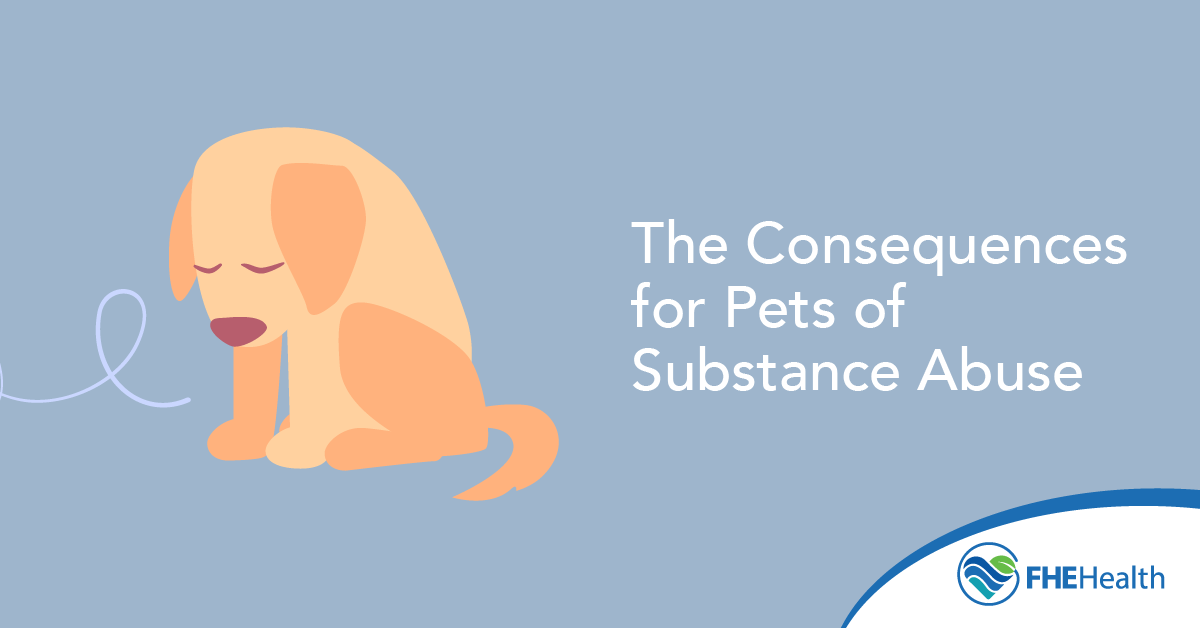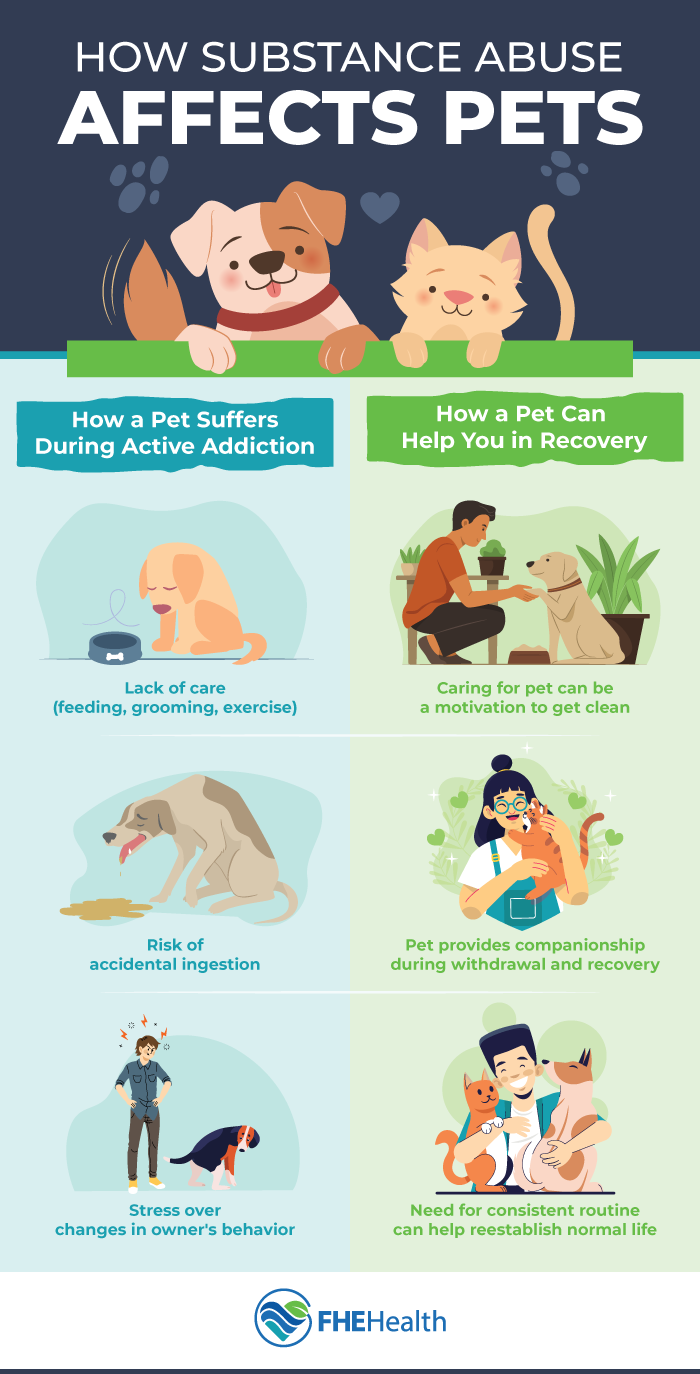
Substance abuse rarely affects just the individual. It tends to become a challenge for everyone in the addict’s life, including the silent companions. Pets need their owners for their health and safety, often mirroring their household’s stress, anxiety and even trauma. From the risks of accidental poisoning to a lack of care for the animal’s basic needs, there’s a good reason why dogs hate drunks or at least find them less than pleasant to live with.
How Substance Abuse Affects Pets
The discussion around substance abuse usually centers around how it impacts individuals, families and communities. Often overlooked are animals living in homes affected by addiction that experience behavioral issues due to neglect and inconsistent care. In homes where drug use and excessive alcohol consumption are prevalent, pets inadvertently become silent witnesses to their owners’ struggles.
Domestic animals, especially dogs and cats, are at risk of accidental poisoning by the owner’s drug of choice. In 2023, the ASPCA Animal Poison Control Center noted a 74% increase in calls related to ingestion of hallucinogenic substances.

Behavioral Changes in Pets Affected by SUDs
Dogs and cats primarily rely on predictability. Any change in their daily environment can cause significant anxiety. In a household affected by substance abuse, care becomes erratic, leading to the animal behaving out of character. Some behaviors that may indicate substance abuse is negatively impacting a pet’s life include:
- Showing teeth. Dogs, in particular, may demonstrate anxiety or aggression due to the unpredictable behavior of their owner. You may also notice increased possessiveness of toys or food.
- Damaging the home. Chewing furniture, scratching doors or breaking household items may increase when pets experience stress and neglect.
- Avoiding humans or other pets. Some pets become timid and hide from other members of the household. Your dog might spend all its time under the bed and refuse to come out, even for feeding.
These changes are the animal’s way of signaling distress. Additionally, animals can get addicted to the same substances their owners use, which is confusing to them.
Health Risks to Pets From Exposure to Drugs and Alcohol
Most pet owners know that certain foods, such as chocolate, could poison their companions. Pets are particularly vulnerable to toxicity due to their inquisitive nature and small size. When it comes to drugs and alcohol, direct exposure poses an immediate risk, as even small quantities of certain chemicals could be fatal.
Dogs and cats may accidentally ingest alcohol, cannabis, opioids or stimulants left accessible by their owners. Even minimal amounts of alcohol can cause symptoms such as disorientation, vomiting, seizures or respiratory failure. Cannabis ingestion has become increasingly common. While some users may find the idea of their dog on drugs humorous, it can cause loss of coordination, lethargy and, in severe cases, coma.
Opioids and prescription medications are particularly dangerous due to their potency; even tiny amounts can lead to respiratory distress or death if immediate veterinary care isn’t provided. Similarly, exposure to stimulant drugs such as methamphetamines can trigger rapid heart rates, seizures and fatal outcomes. A recent study found that 44% of cases where the pet swallowed its owner’s illicit drugs resulted in the animal’s death.
The risk isn’t limited to ingestion. Secondhand smoke from tobacco, marijuana or crack cocaine can cause respiratory distress. Additionally, environments affected by drug use may also present hazards, such as contaminated needles or broken glass. Even seemingly minor incidents can escalate and require emergency veterinary care.
Emotional Impact: Why Do Dogs Hate Drunks?
There’s a growing body of scientific literature on the positive impact pets have on their owners’ recovery from addiction and mental health conditions. Animals form emotional attachments with their owners, but their well-being is just as tied to their sense of security and routine.
Animals need consistency and affectionate care from their owners. Pets can experience emotional distress when their routines are disrupted. Repeatedly skipping walks while hungover, not sticking to a set feeding schedule and constantly ignoring the animal’s attempts to interact can cause chronic stress. Over time, neglected pets may show symptoms of depression, such as loss of appetite. Dogs might stop showing excitement for walks, and cats may cease grooming themselves.
When the environment becomes volatile due to substance abuse, pets experience emotional distress similar to human anxiety and depression. Dogs have been known to bark at their owners when they’re under the influence out of worry. Substances change the way people act, and dogs can sense this. Over time, the animal may begin to interpret the smell of alcohol or drugs as a sign of danger.
Pets that endure prolonged emotional stress can develop chronic health issues related to anxiety, including gastrointestinal disorders and skin conditions caused by over-grooming. Leaving these issues unaddressed can impact the animal’s quality of life and even shorten its lifespan.
How to Protect Pets and Get Help
Wherever you are on your recovery journey, some practical steps to help keep dogs and cats safe from the impact of substance abuse include:
- Keep dangerous substances out of reach. Store medications, alcohol, cannabis and other harmful substances securely. Use locked cabinets if the animal is resourceful enough to open doors or sneak into containers.
- Be consistent. If you struggle with the pet’s routine, ask a trusted family member or friend to step in temporarily.
- Seek treatment. The most effective way to protect pets is to address substance abuse. Addiction treatment and rehabilitation programs significantly improve outcomes for individuals struggling with substance use.
- Consider foster arrangements. Local shelters and fostering programs often work with individuals entering recovery programs and can provide temporary care for your beloved companion.
When substance abuse is present, the emotional bond between humans and pets suffers. Pets rely on their human caretakers and can’t advocate for themselves.
Worried About a Pet’s Well-Being?
If you recognize the signs of substance abuse and are concerned about your or a loved one’s pet, there’s no better time to turn things around. Contact FHE Health today to learn about our treatment options. We’re here to listen and help you rebuild a safe home for you and your furry friends.






